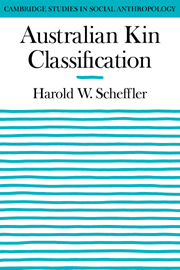Book contents
- Frontmatter
- Contents
- List of tables
- List of figures
- Preface
- Map of tribal locations in Australia
- 1 Preliminary considerations
- 2 Types and varieties
- 3 Pitjantjara
- 4 Kariera–like systems
- 5 Nyulnyul and Mardudhunera
- 6 Karadjeri
- 7 Arabana
- 8 Yir Yoront and Murngin
- 9 Walbiri and Dieri
- 10 Ngarinyin
- 11 An overview
- 12 Kin classification and section systems
- 13 Variation in subsection systems
- 14 Kinship and the social order
- Notes
- References
- Indexes
5 - Nyulnyul and Mardudhunera
Published online by Cambridge University Press: 29 September 2009
- Frontmatter
- Contents
- List of tables
- List of figures
- Preface
- Map of tribal locations in Australia
- 1 Preliminary considerations
- 2 Types and varieties
- 3 Pitjantjara
- 4 Kariera–like systems
- 5 Nyulnyul and Mardudhunera
- 6 Karadjeri
- 7 Arabana
- 8 Yir Yoront and Murngin
- 9 Walbiri and Dieri
- 10 Ngarinyin
- 11 An overview
- 12 Kin classification and section systems
- 13 Variation in subsection systems
- 14 Kinship and the social order
- Notes
- References
- Indexes
Summary
This chapter focuses on the Nyulnyul and Mardudhunera systems of kin classification. Both have been described (by Elkin and Radcliffe-Brown respectively) as Aranda–type systems, largely because they are associated with prohibitions on marriage between cross cousins and close classificatory ‘cousins’, and because they classify grandparents and their siblings in a manner that seems consistent with this prohibition and with preference for marriage between the offspring of same–sex cross cousins (e.g., between a man and his MMBDD). Radcliffe-Brown divided his Aranda–type systems not only into “fully developed” and not–fully–developed “varieties,” but also into two other “varieties” according to whether or not certain kintypes of ego's own generation (e.g., MMBSC) are terminologically identified with certain kintypes of the second ascending and descending generations (e.g., MM, MMB, wDC, ZDC). Where they are he attributed this to the principle of equivalence of agnatic kin of alternate generations. According to Radcliffe-Brown the Mardudhunera system features this principle, and from Elkin's published accounts it would seem that the Nyulnyul system does, too.
It may be shown, however, that there are no basic structural differences between the Nyulnyul and Mardudhunera systems and the Kariera–like systems discussed in Chapter 4. The Nyulnyul and Mardudhunera systems do not incorporate rules of structural equivalence of agnatic kin of alternate generations; their most distinctive equivalence rules are, again, the parallel–cross neutralization rule and the parallel–cross status-extension rule.
- Type
- Chapter
- Information
- Australian Kin Classification , pp. 172 - 207Publisher: Cambridge University PressPrint publication year: 1978



